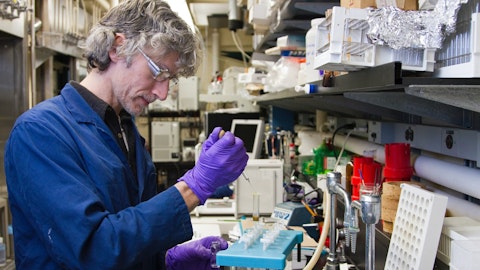Andrew Tsai: Okay. None other sites. Okay. And so I guess, maybe a bigger-picture question is, is this situation of paradoxical results, is it a common occurrence in failed depression studies? Or is this kind of an exception due to COVID? Just curious what your bigger-picture thought is.
Sergio Traversa: Dr. Fava, can you help me out on this? You are really the expert.
Maurizio Fava: Sure. So if you look at approved antidepressants, all the meta analysis have shown that about 40% of the proved antidepressants were — 40% of the trials were positive. And the 60% of those studies that were positive, typically, what contributed to the lack of signal detection was an average placebo response that was excessive. So an analysis by show that when you have placebo response rates above 40%, you tend to lose the ability to detect a signal. And however, the challenge for monotherapy trials is right now the current stressful situation, the economy, the pandemic situation, so forth, because it will inflate the rates of depression in general population. And if you are simply looking at an acute major depressive episode, those patients that have a response to the stress do meet criteria.
So unless you specify that you want chronic and recurrent depression in monotherapy, unless you specify — we did not do that — you’re more likely to have this what we call atypical spontaneous remissions because of the situation we’re in. And I apologize, Sergio, but I have another call at 5:15. So I only have three minutes left.
Sergio Traversa: Thank you, Maurizio. Highly appreciate it.
Andrew Tsai: And one last one is just the cadence of the event. So it sounds like RELIANCE I reads out December. Would you then meet with the FDA to kind of discuss whether you can make certain improvements to RELIANCE II following RELIANCE I, depending on whatever outcome it shows and then you get back to The Street? And then would be those certain improvements?
Sergio Traversa: Yes. Thanks, Andrew. At this time — well, first, we really want to see the RELIANCE I result. And — but at this point, we don’t think there is really any need to meet with the FDA because the changes plan that we are actually implementing in RELIANCE II and most likely in any of the trial, who will do more additional trial in the future, they’re not FDA-depending. It’s really purely operational. Like nearly, I can give you some examples a few of them, but they’re limiting the number of patients enrolled per site. Like when a site enrolls four patients and do an audit and see how things are going to be sure that the site perform at the maximum level. We probably we are making some change in the ratings, and the decentralized rating may add maybe too much variability, and we may centralize more of the rating.
There are quite a bit of — the protocol, we are simplifying the protocol of RELIANCE II and any other potential trial. Reason being that we now have a very large amount of treated patients and safety data. So there is no need to add ECGs. And so the protocol will be more simple, so it would be also easier for the site to enroll patients. Now we can go on, on all these, but these are all operational non-FDA-related changes. Nothing is to tell.
Maurizio Fava: And Sergio, if 301 is positive, then we won’t necessarily to have make major operational changes to III or II.
Sergio Traversa: Correct.
Andrew Tsai: Okay. And just one last clarifying is none of the outlier sites are in RELIANCE II. Is that what I heard you say earlier?
Sergio Traversa: Correct. Correct.
Andrew Tsai: Okay, all right. Thank you —


